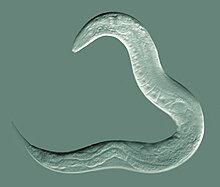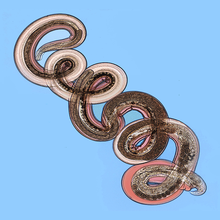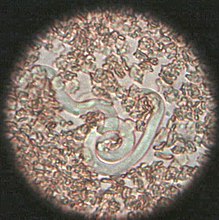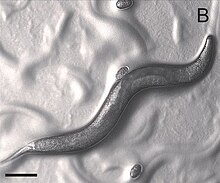線蟲的分類
| 線蟲動物門 化石時期:
| |
|---|---|

| |
| 秀麗隱桿線蟲(Caenorhabditis elegans)是線蟲的一種 | |
| 科學分類 | |
| 界: | 動物界 Animalia |
| 亞界: | 真後生動物亞界 Eumetazoa |
| 演化支: | 副同源異形基因動物 ParaHoxozoa |
| 演化支: | 兩側對稱動物 Bilateria |
| 演化支: | 腎管動物 Nephrozoa |
| 演化支: | 原口動物 Protostomia |
| 總門: | 蛻皮動物總門 Ecdysozoa |
| 演化支: | 環神經動物 Cycloneuralia |
| 演化支: | 線蟲動物 Nematoida |
| 門: | 線蟲動物門 Nematoda Diesing, 1861 |
| 綱 | |
| 異名 | |
| |

線蟲的分類系統由於線蟲動物門的種類繁多,下領約2.5萬個有紀錄的物種(估計總共有差不多100萬個物種[2]),其分類至今尚有不同意見。以下列舉數位學者的分類表:
本分類最初由Karl Rudolphi於1808年定義為「Nematoidea」[3],取名於古希臘文的νῆμα(nêma, nêmatos,線的意思)及後綴-eiδἠς(-eidēs,物種)。本分類後來被Burmeister於1837年被重新分類,取名為「Nematodes科」[3];到1861年再由K. M. Diesing升格成為「Nematoda目」[3]。
線蟲的物種很不容易區分,有相關描述的已超過二萬五千種[4][5],其中超過一半是寄生性的(包括許多植物及人類在內動物的病原體)[6]。線蟲的物種數估計超過一百萬種[2],只有節肢動物比線蟲更多樣化。線蟲的消化系統是有二個開口的管狀消化系統,和刺胞動物門及扁形動物門不同。
線蟲幾乎已經適應了地球所有的生態系,從海洋(海水)到淡水、土壤、極地到赤道、也包括不同海拔高度的地區。牠們在淡水、海水、陸地上隨處可見,並在極端的環境如南極和海溝都可發現,其個體數量及物種個數會常常超過其他的動物,甚至在高山、沙漠、南極和海溝中都可以生存。在岩石圈每個部份都有線蟲的存在[7],甚至是在南非地下900公尺到3600公尺深的金礦坑表面也不例外[8][9][10][11][7]。海床上有90%的動物是線蟲[12]。線蟲的數量眾多,常常每立方公尺就有上百萬個線蟲,佔地球所有動物的80%,線蟲生命週期的多様性,在各種營養條件下都有存在,也使得他們在許多生態系統中有重要的影響[13]。有些線蟲會有隱生的特性。
線蟲原先在1919年被Nathan Cobb命名為Nemata。後來,牠們被降級為囊蠕蟲中的一綱,最後才被重新分類至線蟲動物門[14]。
根據WoRMS,截至2018年1月14日[update],線蟲動物主要分為色矛綱與刺嘴綱兩大分類,還有少量未能歸屬的分類單元;而Adenophorea及Secernentea這兩個綱不再使用[15]。這兩大分類的組成部分詳列如下。
色矛綱
[編輯]色矛綱(Chromadorea)之下只有色矛亞綱(Chromadoria)一個分類單元,包括下列各目:
- 薄咽目 Araeolaimida[16]
- 微斑線蟲總科 Axonolaimoidea Filipjev, 1918[17]
- 薄咽科 Araeolaimidae De Coninck, 1965
- 微斑線蟲科 Axonolaimidae Filipjev, 1918
- Bodonematidae Jensen, 1991
- 聯體線蟲科 Comesomatidae Filipjev, 1918
- Coninckiidae Lorenzen, 1981
- 雙盾線蟲科 Diplopeltidae Filipjev, 1918
- 微斑線蟲總科 Axonolaimoidea Filipjev, 1918[17]
- 色矛目 Chromadorida
- 色矛亞目 Chromadorina
- 色矛總科 Chromadoroidea Filipjev, 1917
- Achromadoridae Gerlach & Riemann, 1973
- 色矛科 Chromadoridae Filipjev, 1917
- Cyatholaimidae Filipjev, 1918
- Ethmolaimidae Filipjev & Schuurmans Stekhoven, 1941
- Neotonchidae Wieser & Hopper, 1966
- Selachinematidae Cobb, 1915
- 色矛總科 Chromadoroidea Filipjev, 1917
- 色矛亞目 Chromadorina
- 鏈環線蟲目 Desmodorida
- 鏈環線蟲亞目 Desmodorina
- 連環線蟲總科 Desmodoroidea Filipjev, 1922
- 鏈環線蟲科 Desmodoridae Filipjev, 1922
- Draconematidae Filipjev, 1918
- Epsilonematidae Steiner, 1927
- 微咽線蟲總科 Microlaimoidea Micoletzky, 1922
- Aponchiidae Gerlach, 1963
- 微咽線蟲科 Microlaimidae Micoletzky, 1922
- 單莖線蟲科 Monoposthiidae Filipjev, 1934
- 連環線蟲總科 Desmodoroidea Filipjev, 1922
- 鏈環線蟲亞目 Desmodorina
- 帶線蟲目 Desmocolecida
- 帶線蟲亞目 Desmocolecina
- 帶線蟲總科 Desmoscolecoidea Shipley, 1896
- Cyartonematidae Tchesunov, 1990
- 帶線蟲科 Desmoscolecidae Shipley, 1896
- †Eophasmidae Poinar, 2011
- Meyliidae de Coninck, 1965
- 帶線蟲總科 Desmoscolecoidea Shipley, 1896
- 帶線蟲亞目 Desmocolecina
- 單宮目 Monhysterida
- 條線蟲亞目 Linhomoeina
- Superfamily Siphonolaimoidea Filipjev, 1918
- Fusivermidae Tchesunov, 1996
- 條線蟲科 Linhomoeidae Filipjev, 1922
- Siphonolaimidae Filipjev, 1918
- Superfamily Siphonolaimoidea Filipjev, 1918
- 單宮線蟲亞目 Monhysterina
- 單宮線蟲總科 Monhysteroidea Filipjev, 1929
- 單宮線蟲科 Monhysteridae de Man, 1876
- Superfamily Sphaerolaimoidea Filipjev, 1918
- Sphaerolaimidae Filipjev, 1918
- 希阿利線蟲科 Xyalidae Chitwood, 1951
- 單宮線蟲總科 Monhysteroidea Filipjev, 1929
- 條線蟲亞目 Linhomoeina
- Order Plectida
- Suborder Ceramonematina
- Superfamily Ceramonematoidea Cobb, 1933
- Ceramonematidae Cobb, 1933
- Diplopeltoididae Tchesunov, 1990
- Paramicrolaimidae Lorenzen, 1981
- Tarvaiidae Lorenzen, 1981
- Tubolaimoididae Lorenzen, 1981
- Superfamily Ceramonematoidea Cobb, 1933
- Incertae sedis
- Superfamily Haliplectoidea Chitwood, 1951
- Haliplectidae Chitwood, 1951
- Aegialoalaimidae Lorenzen, 1981
- Aulolaimidae Jairajpuri & Hopper, 1968
- Superfamily Haliplectoidea Chitwood, 1951
- Suborder Plectina
- Superfamily Camacolaimoidea Micoletzky, 1924
- Camacolaimidae Micoletzky, 1924
- Rhadinematidae Lorenzen, 1981
- Superfamily Leptolaimoidea Örley, 1880
- Aphanolaimidae Chitwood, 1936
- Leptolaimidae Örley, 1880
- Superfamily Ohridioidea (Andrassy, 1976)
- Creagrocercidae Baylis, 1943
- Ohridiidae Andrássy, 1976
- Superfamily Plectoidea Örley, 1880
- Chronogastridae Gagarin, 1975
- Metateratocephalidae Eroshenko, 1973
- Plectidae Örley, 1880
- Superfamily Camacolaimoidea Micoletzky, 1924
- Suborder Ceramonematina
- 小杆目 Rhabditida
- Incertae sedis
- Brevibuccidae Paramonov, 1956
- Chambersiellidae Thorne, 1937
- Teratocephalidae Andrassy, 1958
- Suborder Myolaimina
- Superfamily Myolaimoidea Andrassy, 1958
- Myolaimidae Andrassy, 1958
- Superfamily Myolaimoidea Andrassy, 1958
- 小杆線蟲亞目 Rhabditina
- Infraorder Bunonematomorpha
- Superfamily Bunonematoidea Micoletzky, 1922
- Bunonematidae Micoletzky, 1922
- Pterygorhabditidae Goodey, 1963
- Superfamily Bunonematoidea Micoletzky, 1922
- Infraorder Diplogasteromorpha
- Superfamily Cylindrocorporoidea Goodey, 1939
- Cylindrocorporidae Goodey, 1939
- Superfamily Diplogasteroidea Micoletzky, 1922
- Cephalobiidae Filipjev, 1934
- Diplogasteridae Micoletzky, 1922
- Diplogasteroididae Filipjev & Schuurmans Stekhoven, 1941
- Mehdinematidae Farooqui, 1967
- Neodiplogasteridae Paramonov, 1952
- Pseudodiplogasteroididae Körner, 1954
- Superfamily Odontopharyngoidea Micoletzky, 1922
- Odontopharyngidae Micoletzky, 1922
- Superfamily Cylindrocorporoidea Goodey, 1939
- Infraorder Rhabditomorpha
- Incertae sedis
- Agfidae Dougherty, 1955
- Carabonematidae Stammer & Wachek, 1952
- Superfamily Mesorhabditoidea Andrassy, 1976
- Mesorhabditidae Andrassy, 1976
- Peloderidae Andrassy, 1976
- Superfamily Rhabditoidea Örley, 1880
- Diploscapteridae Micoletzky, 1922
- 小杆線蟲科 Rhabditidae Örley, 1880
- Superfamily Strongyloidea Baird, 1853
- 鉤口線蟲科 Ancylostomatidae Looss, 1905
- Diaphanocephalidae Travassos, 1920
- Heligmosomidae Cram, 1927
- Heterorhabditidae Poinar, 1976
- Metastrongylidae Diesing, 1851
- Moleinidae Durette-Desset & Chabaud, 1977
- Strongylidae Baird, 1853
- Trichostrongylidae Leiper, 1912
- Incertae sedis
- Infraorder Bunonematomorpha
- 旋尾亞目 Spirurina
- 蛔形下目 Ascaridomorpha
- 蛔蟲總科 Ascaridoidea Baird, 1853
- Acanthocheilidae Wülker, 1929
- 海獸胃線蟲科 Anisakidae Railliet & Henry, 1912
- 蛔蟲科 Ascarididae Baird, 1853
- Heterocheilidae Railliet & Henry, 1915
- Raphidascarididae Hartwich, 1954
- Superfamily Cosmocercoidea Travassos, 1925
- Atractidae Travassos, 1919
- Cosmocercidae Travassos, 1925
- Kathlaniidae Travassos, 1918
- Superfamily Heterakoidea Railliet & Henry, 1912
- Ascaridiidae Travassos, 1919
- Aspidoderidae Skrjabin & Shikhobalova, 1947
- Heterakidae Railliet & Henry, 1912
- Superfamily Seuratoidea Railliet, 1906
- Chitwoodchabaudiidae Puylaert, 1970
- Cucullanidae Cobbold, 1864
- Quimperiidae Gendre, 1928
- Schneidernematidae Freitas, 1956
- Seuratidae Railliet, 1906
- Superfamily Subuluroidea Yorke & Maplestone, 1926
- Maupasinidae Inglis, 1959
- Subuluridae Yorke & Maplestone, 1926
- 蛔蟲總科 Ascaridoidea Baird, 1853
- 顎口線蟲下目 Gnathostomatomorpha
- 顎口線蟲總科 Gnathostomatoidea Railliet, 1895
- 顎口線蟲科 Gnathostomatidae Railliet, 1895
- 顎口線蟲總科 Gnathostomatoidea Railliet, 1895
- Incertae sedis
- 龍線蟲總科 Dracunculoidea Stiles, 1907
- Anguillicolidae Yamaguti, 1935
- Daniconematidae Moravec & Køie, 1987
- 龍線蟲科 Dracunculidae Stiles, 1907
- Guyanemidae Petter, 1975
- Micropleuridae Baylis & Daubney, 1926
- 嗜子宮線蟲科 Philometridae Baylis & Daubney, 1926
- Skrjabillanidae Shigin & Shigina, 1958
- 龍線蟲總科 Dracunculoidea Stiles, 1907
- 尖尾線蟲下目 Oxyuridomorpha
- 尖尾線蟲總科 Oxyuroidea Cobbold, 1864
- Heteroxynematidae Skrjabin & Shikhobalova, 1948
- 尖尾線蟲科 Oxyuridae Cobbold, 1864
- Pharyngodonidae Travassos, 1919
- Superfamily Thelastomatoidea Travassos, 1929
- Hystrignathidae Travassos, 1929
- Protrelloididae Chitwood, 1932
- Thelastomatidae Travassos, 1929
- Travassosinematidae Rao, 1958
- 尖尾線蟲總科 Oxyuroidea Cobbold, 1864
- Infraorder Rhigonematomorpha
- Superfamily Ransomnematoidea Travassos, 1930
- Camoyidae Travassos & Kloss, 1960
- Hethidae Travassos & Kloss, 1960
- Ransomnematidae Travassos, 1930
- Superfamily Rhigonematoidea Artigas, 1930
- Ichthyocephalidae Travassos & Kloss, 1958
- Rhigonematidae Artigas, 1930
- Superfamily Ransomnematoidea Travassos, 1930
- 旋尾下目 Spiruromorpha
- 華首總科 Acuarioidea Railliet, Henry & Sisoff, 1912
- 華首科 Acuariidae Railliet, Henry & Sisoff, 1912
- Aproctoidea Skrjabin & Shikhobalova, 1945
- Aproctidae Skrjabin & Shikhobalova, 1945
- Desmidocercidae Cram, 1927
- Camallanoidea Travassos, 1920
- Camallanidae Railliet & Henry, 1915
- 雙三齒線蟲總科 Diplotriaenoidea Anderson, 1958
- 雙三齒線蟲科 Diplotriaenidae Anderson, 1958:在Levin (1968)屬絲蟲總科
- Oswaldofilariidae Chabaud & Choquet, 1953
- 絲蟲總科 Filarioidea Chabaud & Anderson, 1959
- 絲蟲科 Filariidae Chabaud & Anderson, 1959
- 蟠尾絲蟲科 Onchocercidae Leiper, 1911
- 柔線蟲總科 Habronematoidea Ivaschkin, 1961
- Cystidicolidae Skrjabin, 1946
- 柔線蟲科 Habronematidae Ivaschkin, 1961
- Hedruridae Railliet, 1916
- Tetrameridae Travassos, 1914
- 泡翼總科 Physalopteroidea Railliet, 1893
- Rictularoidea Railliet, 1916
- Rictulariidae Railliet, 1916
- 旋尾總科 Spiruroidea Oerley, 1885
- Gongylonematidae Sobolev, 1949
- Hartertiidae Quentin, 1970
- Spirocercidae Chitwood & Wehr, 1932
- 旋尾科 Spiruridae Oerley, 1885
- 吸吮總科 Thelazioidea Skrjabin, 1915
- Pneumospiruridae Wu & Hu, 1938
- Rhabdochonidae Skrjabin, 1946
- 吸吮科 Thelaziidae Skrjabin, 1915
- 華首總科 Acuarioidea Railliet, Henry & Sisoff, 1912
- 蛔形下目 Ascaridomorpha
- Suborder Tylenchina
- Infraorder Cephalobomorpha
- Superfamily Cephaloboidea Filipjev, 1934
- Alirhabditidae Suryawanshi, 1971
- Bicirronematidae Andrassy, 1978
- Cephalobidae Filipjev, 1934
- Elaphonematidae Heyns, 1962
- Osstellidae Heyns, 1962
- Superfamily Cephaloboidea Filipjev, 1934
- Infraorder Drilonematomorpha
- Superfamily Drilonematoidea Pierantoni, 1916
- Drilonematidae Pierantoni, 1916
- Homungellidae Timm, 1966
- Pharyngonematidae Chitwood, 1950
- Ungellidae Chitwood, 1950
- Superfamily Drilonematoidea Pierantoni, 1916
- Incertae sedis
- Superfamily Anguinoidea Nicoll, 1935
- Infraorder Panagrolaimomorpha
- Superfamily Panagrolaimoidea Thorne, 1937
- Panagrolaimidae Thorne, 1937
- Superfamily Strongyloidoidea Chitwood & McIntosh, 1934
- Alloionematidae Chitwood & McIntosh, 1934
- Rhabdiasidae Railliet, 1916
- 斯氏線蟲科 Steinernematidae Filipjev, 1934
- Strongyloididae Chitwood & McIntosh, 1934
- Superfamily Panagrolaimoidea Thorne, 1937
- 墊刃線蟲下目 Tylenchomorpha
- 滑刃線蟲總科 Aphelenchoidea
- 滑刃線蟲科 Aphelenchoididae Fuchs, 1937[18]
- 有尾片芽葉線蟲科 Aphelenchidae Fuchs, 1937
- 少尾片芽葉線蟲科 Aphelenchoididae Skarbilovich, 1947
- Superfamily Criconematoidea Taylor, 1936
- Criconematidae Taylor, 1936
- Hemicycliophoridae Skarbilovich, 1959
- 半穿刺線蟲科 Tylenchulidae Skarbilovich, 1947
- Superfamily Myenchoidea Pereira, 1931
- Myenchidae Pereira, 1931
- Superfamily Sphaerularioidea Lubbock, 1861
- Anguinidae Nicoll, 1935
- Iotonchidae Goodey, 1935
- Neotylenchidae Thorne, 1941
- Sphaerulariidae Lubbock, 1861
- 墊刃線蟲總科 Tylenchoidea Örley, 1880
- 刺線蟲科 Belonolaimidae Whitehead, 1959
- Dolichodoridae Chitwood, 1950
- Hoplolaimidae Filipjev, 1934
- 根結線蟲科 Meloidogynidae Skarbilovich, 1959
- 短體線蟲科 Pratylenchidae Thorne, 1949
- 墊刃線蟲科 Tylenchidae Örley, 1880
- 滑刃線蟲總科 Aphelenchoidea
- Infraorder Cephalobomorpha
- Incertae sedis
- Order Spirurida
- Suborder Camallanina
- Order Strongylida
- Superfamily Metastrongyloidea Lane, 1917
- Pseudaliidae Railliet & Henry, 1909
- Superfamily Trichostrongyloidea (Durette-Desset, 1985)
- Amidostomatidae Baylis & Daubney, 1926
- Superfamily Metastrongyloidea Lane, 1917

- Order Dioctophymatida
- Suborder Dioctophymatina
- Dioctophymatidae Railliet, 1915
- Soboliphymatidae Petrov, 1930
- Suborder Dioctophymatina
- 矛線目 Dorylaimida
- 矛線亞目 Dorylaimina
- Superfamily Belondiroidea Thorne, 1964
- Belondiridae Thorne, 1939
- Superfamily Dorylaimoidea de Man, 1876
- Actinolaimidae Thorne, 1939
- Aporcelaimidae Heyns, 1965
- Dorylaimidae de Man, 1876
- Longidoridae Thorne, 1935
- Nordiidae Jairajpuri & Siddiqi, 1964
- Qudsianematidae Jairajpuri, 1965
- Incertae sedis
- Thornenematidae Siddiqi, 1969
- Thorniidae de Coninck, 1965
- Superfamily Tylencholaimoidea Filipjev, 1934
- Aulolaimoididae Jairajpuri, 1964
- Leptonchidae Thorne, 1935
- Mydonomidae Thorne, 1964
- Tylencholaimellidae Jairajpuri, 1964
- Tylencholaimidae Filipjev, 1934
- Superfamily Belondiroidea Thorne, 1964
- Suborder Nygolaimina
- Superfamily Nygolaimoidea Thorne, 1935
- Aetholaimidae Jairajpuri, 1965
- Nygellidae Andrassy, 1958
- Nygolaimellidae Clark, 1961
- Nygolaimidae Thorne, 1935
- Superfamily Nygolaimoidea Thorne, 1935
- 矛線亞目 Dorylaimina
- Order Isolaimida
- Superfamily Isolaimoidea Timm, 1969
- Isolaimiidae Cobb, 1920
- Superfamily Isolaimoidea Timm, 1969
- Order Marimermithida
- Marimermithidae Rubtzov & Platonova, 1974
- 索線蟲目 Mermithida
- Suborder Mermithina
- Superfamily Mermithoidea Braun, 1883
- 索線蟲科 Mermithidae Braun, 1883
- Tetradonematidae Cobb, 1919
- Superfamily Mermithoidea Braun, 1883
- Suborder Mermithina
- 單齒目 Monochida
- Suborder Bathyodontina
- Superfamily Cryptonchoidea Chitwood, 1937
- Bathyodontidae Clark, 1961
- Cryptonchidae Chitwood, 1937
- Superfamily Mononchuloidea de Coninck, 1965
- Mononchulidae de Coninck, 1965
- Superfamily Cryptonchoidea Chitwood, 1937
- Suborder Mononchina
- Superfamily Anatonchoidea Jairajpuri, 1969
- Anatonchidae Jairajpuri, 1969
- Incertae sedis
- Cobbonchidae Jairajpuri, 1969
- Iotonchidae Jairajpuri, 1969
- Superfamily Mononchoidea Filipjev, 1934
- Mononchidae Filipjev, 1934
- Mylonchulidae Jairajpuri, 1969
- Superfamily Anatonchoidea Jairajpuri, 1969
- Suborder Bathyodontina
- Order Muspiceida
- Suborder Muspiceina
- Muspiceidae Bain & Chabaud, 1959
- Robertdollfusiidae Chabaud & Campana, 1950
- Suborder Muspiceina
- Order Trichinellida
- Superfamily Trichinelloidea Ward, 1907
- Anatrichosomatidae Yamaguti, 1961
- Capillariidae Railliet, 1915
- Cystoopsidae Skrjabin, 1923
- Trichinellidae Ward, 1907
- Trichosomoididae Yorke & Maplestone, 1926
- Trichuridae Railliet, 1915
- Superfamily Trichinelloidea Ward, 1907

- 刺嘴目 Enoplida
- Suborder Alaimina
- Superfamily Alaimoidea Micoletzky, 1922
- Alaimidae Micoletzky, 1922
- Superfamily Alaimoidea Micoletzky, 1922
- Suborder Campydorina
- Superfamily Campydoroidea Jairajpuri, 1976
- Campydoridae (Thorne, 1935)
- Superfamily Campydoroidea Jairajpuri, 1976
- Suborder Dioctophymina
- 刺嘴亞目 Enoplina
- Superfamily Enoploidea Dujardin, 1845
- Anoplostomatidae Gerlach & Riemann, 1974
- Anticomidae Filipjev, 1918
- Enoplidae Dujardin, 1845
- Phanodermatidae Filipjev, 1927
- Thoracostomopsidae Filipjev, 1927
- Superfamily Enoploidea Dujardin, 1845
- Incertae sedis
- Andrassyidae Tchesunov & Gagarin, 1999
- Suborder Ironina
- Superfamily Ironoidea de Man, 1876
- Ironidae de Man, 1876
- Leptosomatidae Filipjev, 1916
- Oxystominidae Chitwood, 1935
- Superfamily Ironoidea de Man, 1876
- Suborder Oncholaimina
- Superfamily Oncholaimoidea Filipjev, 1916
- Enchelidiidae Filipjev, 1918
- Oncholaimidae Filipjev, 1916
- Thalassogeneridae Orton Williams & Jairajpuri, 1984
- Superfamily Oncholaimoidea Filipjev, 1916
- Suborder Trefusiina
- Superfamily Trefusioidea Gerlach, 1966
- Lauratonematidae Gerlach, 1953
- Simpliconematidae Blome & Schrage, 1985
- Trefusiidae Gerlach, 1966
- Trischistomatidae Andrassy, 2007
- Xenellidae de Coninck, 1965
- Superfamily Trefusioidea Gerlach, 1966
- Suborder Trichinellina
- Suborder Tripyloidina
- Superfamily Tripyloidoidea Filipjev, 1928
- Tripyloididae Filipjev, 1918
- Superfamily Tripyloidoidea Filipjev, 1928
- Suborder Alaimina
- Order Triplonchida
- Suborder Diphtherophorina
- Superfamily Diphtherophoroidea Micoletzkyi, 1922
- Diphtherophoridae Micoletzky, 1922
- Trichodoridae Thorne, 1935
- Superfamily Diphtherophoroidea Micoletzkyi, 1922
- Incertae sedis
- Bastianiidae de Coninck, 1965
- Odontolaimidae Gerlach & Riemann, 1974
- Suborder Tobrilina
- Superfamily Prismatolaimoidea Micoletzky, 1922
- Prismatolaimidae Micoletzky, 1922
- Superfamily Tobriloidea Filipjev, 1918
- Pandolaimidae Belogurov, 1980
- Rhabdodemaniidae Filipjev, 1934
- Tobrilidae de Coninck, 1965
- Triodontolaimidae de Coninck, 1965
- Superfamily Prismatolaimoidea Micoletzky, 1922
- Suborder Tripylina
- Superfamily Tripyloidea de Man, 1876
- Tripyloidea de Man, 1876
- Tripylidae de Man, 1876
- Superfamily Tripyloidea de Man, 1876
- Suborder Diphtherophorina
- Order Benthimermithida
- Benthimermithidae Petter, 1980
- Order Rhaptothyreida
- Rhaptothyreidae Hope & Murphy, 1969






胞管腎綱之下的綱目計有[19]:
- 雙胃亞綱 Diplogasteria:亦作雙胃線蟲亞綱,可能與Rhabditia為並系群[19]
- 小杆亞綱 Rhabditida:可能為並系群[19]
- 旋尾亞綱 Spiruria
- 蛔目 Ascaridida:海獸胃線蟲
- 駝形線蟲目 Camallanida:有其他文獻歸入旋尾目
- 蚓線目 Drilonematida:有其他文獻歸入旋尾目
- 尖尾目 Oxyurida (= Rhabdiasida):亦作尖尾線蟲目,例如:蟯蟲
- 里崗目 Rhigonematida:舊屬墊刃亞綱
- 旋尾目 Spirurida:麥地那龍線蟲
- 墊刃亞綱 Tylenchia:可能與Rhabditia為並系群[19]
雙胃線蟲亞綱
[編輯]雙胃線蟲亞綱(Diplogasteria)可能與Rhabditia為並系群[19]

- 雙胃線蟲目 Diplogasterida
- Suborder Chambersiellina Hodda 2007
- Superfamily Chambersielloidea Thorne 1937
- Family Chambersiellidae Thorne 1937 (Sanwal 1957)
- Superfamily Chambersielloidea Thorne 1937
- Suborder Diplogasterina Paramonov 1952
- Superfamily Cylindrocorporoidea T. Goodey 1939
- Family Cylindrocorporidae T. Goodey 1939
- Family Odontopharyngidae Micoletzky 1922
- Superfamily Diplogasteroidea Micoletzky 1922
- Family Cephalobiidae Travassos & Kloss 1960a
- Family Diplogasteridae Micoletzky 1922
- Family Diplogasteroididae Paramonov 1952
- Family Neodiplogasteridae Paramonov 1952
- Family Pseudodiplogasteroididae De Ley & Blaxter 2002
- Family Tylopharyngidae Filipjev 1918
- Superfamily Cylindrocorporoidea T. Goodey 1939
- Suborder Myolaimina Inglis 1983
- Superfamily Carabonematoidea Stammer & Wachek 1952
- Family Carabonematidae Stammer & Wachek 1952
- Superfamily Myolaimoidea Goodey 1963
- Family Myolaimidae Goodey 1963
- Superfamily Carabonematoidea Stammer & Wachek 1952
小杆亞綱
[編輯]旋尾亞綱
[編輯]旋尾亞綱包括:
- 蛔目 Ascaridida:海獸胃線蟲
- 駝形線蟲目 Camallanida:有其他文獻歸入旋尾目
- Family Anguillicolidae
- Family Camallanidae
- 龍線蟲科 Dracunculidae
- Family Micropleudidae
- Family Philometridae
- 蚓線目 Drilonematida:有其他文獻歸入旋尾目
- 尖尾目 Oxyurida (= Rhabdiasida):亦作尖尾線蟲目,例如:蟯蟲
- Family Heteroxynematidae
- 尖尾線蟲科 Oxyuridae:舊屬小杆線蟲目
- Family Pharyngodonidae
- Family Thelastomatidae
- 里崗目 Rhigonematida:舊屬墊刃亞綱
- 旋尾目 Spirurida:麥地那龍線蟲
- 華首總科 Acuarioidea Railliet, Henry & Sisoff, 1912
- Aproctoidea Skrjabin & Shikhobalova, 1945
- 雙三齒線蟲總科 Diplotriaenoidea Anderson, 1958
- 絲蟲總科 Filarioidea Chabaud & Anderson, 1959
- Superfamily Gnathostomatoidea:現時屬於獨自的Gnathostomatomorpha下目
- Habronematoidea Ivaschkin, 1961
- 泡翼總科 Physalopteroidea Railliet, 1893
- Rictularioidea Railliet, 1916
- 旋尾總科 Spiruroidea Oerley, 1885
- 吸吮總科 Thelazioidea Skrjabin, 1915
墊刃亞綱
[編輯]
- 滑刃目 Aphelenchida
- 滑刃線蟲總科 Aphelenchoidea
- Family Aphelenchidae
- 滑刃線蟲科 Aphelenchoididae
- Family Myenchildae
- Family Paraphelenchidae
- 滑刃線蟲總科 Aphelenchoidea
- 墊刃線蟲目 Tylenchida
- 環線蟲總科 Criconematoidea
- 墊刃線蟲總科 Tylenchoidea
- Family Anguinidae
- Family Belonolaimidae
- Family Dolichodoridae
- Family Ecphyadophoridae
- Family Hoplolaimidae
- Family Heteroderidae
- Family Pratylenchidae
- 墊刃線蟲科 Tylenchidae
- Superfamily Sphaerularina
- Family Allantonematidae
- Family Fergusobiidae
- Family Iotonchiidae
- Family Parasitylenchidae
- Family Sphaerulariidae
過往分類及其理據
[編輯]親緣支序學
[編輯]線蟲及跟其他關係較為接近的原口動物的親緣關係尚未解決。 傳統上,線蟲動物被認為有其自己獨特的血統,但到了1990年代,有意見認為線蟲動物應與其他諸如節肢動物的被提出與蛻皮動物合組成為蛻皮動物總門(Ecdysozoa)。 過往一直認為與線蟲動物最接近的生物誰屬這個問題已有很好很好的解決了。 形態特徵和分子系統發育學的結果都認為寄生性的線形動物門(例如:馬毛蟲)跟圓蟲是姊妹分類單元,而這兩個分類單元共同組成了Nematoida。 連同有棘動物,線蟲動物與牠們共同組成了環神經動物類(Cycloneuralia,又或Introverta)物種現時被視為線蟲動物門之上的一個演化支,過往的分類如果承認這種劃分的話,一般將之歸類到了總門或超門級[20]。
Chitwood & Chitwood
[編輯]早期最有影響力的分類系統是BG Chitwood & MB Chitwood 兄弟 (1933)[21]—然後四年後BG Chitwood又再修訂這個分類[22]—此分類系統將線蟲分為無尾感器亞綱(Aphasmidia)及尾感器亞綱(Phasmidia)。 這兩個亞綱後來重新命名為有腺綱(Adenophorea)及胞管腎綱(Secernentea)[23]。 胞管腎綱有許多共同的特徵,包括具有尾感器,也就是一對在後方兩側之處的感覺器官,這也成為分類的基礎。因為無尾感器亞綱這個分類中還有些不同,因此也產生了許多後續不同的分類。
1961年山口分類
[編輯]Yamaguti(1961)關於寄生在脊椎動物的線蟲種類的分類系統
- 棒線目(Rhabdiasidea)
- 鞭蟲目(Trichuridea)
- 膨結目(Diotophymidea)
- 魚園線目(Ichthyostrongylidea)
- 園線目(Strongylidea)
- 尖尾目(Oxyuridea)
- 蛔目(Ascarididea)
- 旋尾目(Spiruridea)
- 絲蟲目(Filariidea)
- 嗜子宮目(Philometridea)
- 僵直線蟲目(Tetanonematidea)
陳心陶(1965年[來源請求])關於線蟲的分類位置及其類群系統
- 線形動物門
1968年Levin分類
[編輯]Levin(1968)關於人畜寄生線蟲的分類系統
- 泄腺綱(Secernentasida)
- 帶腺綱(Adenophorasida)
1980年孔繁瑤分類
[編輯]孔繁瑤教授關於線蟲分類的意見(按孔教授1980年講演材料)
1981年Maggenti分類
[編輯]Maggenti(1981)線蟲分類意見
1998年分類
[編輯]早期的DNA 排序研究[查證請求]認為線蟲應該包括下列五個演化支[24]:
As it seems, the Secernentea are indeed a natural group of closest relatives. But the "Adenophorea" appear to be a paraphyletic assemblage of roundworms simply retaining a good number of ancestral traits. The old Enoplia do not seem to be monophyletic either, but to contain two distinct lineages. The old group "Chromadoria" seem to be another paraphyletic assemblage, with the Monhysterida representing a very ancient minor group of nematodes.
在胞管腎綱(Secernentea)之下各個亞綱,雙胃線蟲亞綱(Diplogasteria)可能會與小桿亞綱(Rhabditia)合併,而Tylenchia亞綱可能與這個合併後的分類為並系群[19]。
2002年分類
[編輯]由於對圓蟲的系統學及支序分類學的認識,使牠們的分類作下列更新:
- Basal order Monhysterida
- Class Dorylaimea
- Class Enoplea
- 胞管腎綱(Secernentea)
- "Chromadorea" assemblage
2006年分類
[編輯]基於對多種線蟲的小亞基rDNA序列幾乎全長的分析,線蟲被認為應該包含至少12個支序[25]: 包括秀麗隱桿線蟲(Caenorhabditis elegans)和幾乎所有主要動植物的寄生蟲在內的胞管腎綱冠群,在有腺綱內非常突出。
有關對線蟲動物門的系統學研究仍在改進中,這包括到分析959條線蟲的基因[26]。
現時世上所有線蟲物種的完整列表,可參看《World Species Index:Nematoda》這本書[27]。
2011年分類
[編輯]來自Hodda (2011)對整個線蟲動物門的重新分類是這類動物最新的更新[28]。在這個更新裡,舊有的絕大多數分類都被歸到色矛綱(Chromadorea)之下;而與色矛綱同級的還有矛線綱(Dorylaimea)及刺嘴綱(Enoplea)[29]。
2013年分類
[編輯]Liu等人 (2013)一項有關粒線體DNA的研究認為下列的分類為合理[30]:
- 矛線亞綱 Dorylaimia
- orders Rhabditida, Trichinellida and Mermithida
- suborder Rhabditina
- infraorders Spiruromorpha and Oxyuridomorpha
The Ascaridomorpha, Rhabditomorpha and Diplogasteromorpha appear to be related.
The suborders Spirurina and Tylenchina and the infraorders Rhabditomorpha, Panagrolaimomorpha and Tylenchomorpha are paraphytic.
The monophyly of the Ascaridomorph is uncertain.
注釋
[編輯]參考文獻
[編輯]- ^ Nematode Fossils. Nematode Fossils [Nematoda].. [2013-04-21]. (原始內容存檔於2021-04-28).
- ^ 2.0 2.1 Lambshead, PJD. Recent developments in marine benthic biodiversity research. Oceanis. 1993, 19 (6): 5–24.
- ^ 3.0 3.1 3.2 Chitwood BG. The English word "Nema" Revised. Systematic Zoology in Nematology Newsletter. 1957, 4 (45): 1619. doi:10.2307/sysbio/6.4.184. (原始內容存檔於2009-02-21).
- ^ Hodda, M. Phylum Nematoda Cobb, 1932. In: Zhang, Z.-Q. (Ed.) Animal biodiversity: An outline of higher-level classification and survey of taxonomic richness. Zootaxa. 2011, 3148: 63–95.
- ^ Zhang, Z. Animal biodiversity: An update of classification and diversity in 2013. In: Zhang, Z.-Q. (Ed.) Animal Biodiversity: An Outline of Higher-level Classification and Survey of Taxonomic Richness (Addenda 2013). Zootaxa. 2013, 3703 (1): 5–11. doi:10.11646/zootaxa.3703.1.3.
- ^ Hsueh YP, Leighton DHW, Sternberg PW. (2014). Nematode Communication. In: Witzany G (ed). Biocommunication of Animals. Springer, 383-407. ISBN 978-94-007-7413-1.
- ^ 7.0 7.1 Borgonie G, García-Moyano A, Litthauer D, Bert W, Bester A, van Heerden E, Möller C, Erasmus M, Onstott TC. Nematoda from the terrestrial deep subsurface of South Africa. Nature. 2011-06, 474 (7349): 79–82. PMID 21637257. doi:10.1038/nature09974 (英語).
- ^ Lemonick MD. Could 'worms from Hell' mean there's life in space?. Time. 2011-06-08 [2011-06-08]. ISSN 0040-781X. (原始內容存檔於2011-06-10).
- ^ Bhanoo SN. Nematode found in mine is first subsurface multicellular organism. The New York Times. 2011-06-01 [2011-06-13]. ISSN 0362-4331. (原始內容存檔於2021-04-28) (英語).
- ^ Gold mine. Nature. 2011-06, 474 (7349): 6. doi:10.1038/474006b.
- ^ Drake, N. Subterranean worms from hell: Nature News. Nature News. 2011-06-01 [2011-06-13]. (原始內容存檔於2021-04-28).
- ^ Danovaro R, Gambi C, Dell'Anno A, Corinaldesi C, Fraschetti S, Vanreusel A, Vincx M, Gooday AJ. Exponential decline of deep-sea ecosystem functioning linked to benthic biodiversity loss. Curr. Biol. January 2008, 18 (1): 1–8. PMID 18164201. doi:10.1016/j.cub.2007.11.056. 簡明摘要 – EurekAlert!.
- ^ Platt HM. foreword. Lorenzen S, Lorenzen SA (編). The phylogenetic systematics of freeliving nematodes. London: The Ray Society. 1994. ISBN 0-903874-22-9.
- ^ Nematoda. ITIS. [2012-06-12].
- ^ Eisendle-Flöckner, Ursula; Mokievsky, Vadim. Nematoda. WoRMS. 2017-01-15 [2018-01-13].
- ^ Araeolaimida. GBIF. [2022-10-29]. (原始內容存檔於2022-10-29).
- ^ Bezerra, Tânia Nara. Axonolaimoidea Filipjev, 1918. WoRMS. 2016-01-19 [2023-09-20] –透過WoRMS.
- ^ 《動物學辭典》在Google Books的內容。
- ^ 19.0 19.1 19.2 19.3 19.4 19.5 19.6 19.7 19.8 Nematoda. Tree of Life Web Project (ToL). 2002-01-01 [2008-11-02]. (原始內容存檔於2013-05-08).
- ^ Bilateria. Tree of Life Web Project (ToL). January 1, 2002 [2008-11-02]. (原始內容存檔於2021-04-28).
- ^ Chitwood, BG; Chitwood, MB. The characters of a protonematode. J Parasitol. 1933, 20: 130.
- ^ Chitwood, BG. A revised classification of the Nematoda. Papers on helminthology, 30 year jubileum K.J. Skrjabin. Moscow: All-Union Lenin Academy of Agricultural Sciences. 1937: 67–79.
- ^ Chitwood, BG. The designation of official names for higher taxa of invertebrates. Bull Zool Nomencl. 1958, 15: 860–95.
- ^ Blaxter ML, De Ley P, Garey JR, Liu LX, Scheldeman P, Vierstraete A, Vanfleteren JR, Mackey LY, Dorris M, Frisse LM, Vida JT, Thomas WK. A molecular evolutionary framework for the phylum Nematoda. Nature. March 1998, 392 (6671): 71–5. PMID 9510248. doi:10.1038/32160.
- ^ Holterman M, van der Wurff A, van den Elsen S, van Megen H, Bongers T, Holovachov O, Bakker J, Helder J. Phylum-wide analysis of SSU rDNA reveals deep phylogenetic relationships among nematodes and accelerated evolution toward crown Clades. Mol Biol Evol. 2006, 23 (9): 1792–1800. PMID 16790472. doi:10.1093/molbev/msl044 (英語).
- ^ 959 Nematode Genomes – NematodeGenomes. Nematodes.org. 2011-11-11 [2012-06-12]. (原始內容存檔於2015-08-05).
- ^ World Species Index:Nematoda. 2012.
- ^ Hodda, Mike. Phylum Nematoda Cobb 1932. Zhang, Z.-Q. (編). Animal biodiversity: An outline of higher-level classification and survey of taxonomic richness (PDF) 3148. 2011: 63–95 [2017-12-16]. (原始內容 (PDF)存檔於2021-04-28).
|journal=被忽略 (幫助) - ^ Phylum Nematoda. WInvertebrates! (威斯康辛無脊椎動物資料庫). 2017-05-04 [2017-12-16]. (原始內容存檔於2021-04-28) (英語).
- ^ Liu, GH; Shao, R; Li, JY; Zhou, DH; Li, H; Zhu, XQ. The complete mitochondrial genomes of three parasitic nematodes of birds: a unique gene order and insights into nematode phylogeny. BMC Genomics. 2013, 14 (1): 414. doi:10.1186/1471-2164-14-414.
